L5 Strategic HRM Case Study: HSBC's Japan Market Exit Analysis
VerifiedAdded on 2023/06/15
|9
|2447
|281
Case Study
AI Summary
This case study analyzes HSBC's experience in the Japanese retail banking market, focusing on the strategic human resource management (SHRM) aspects that contributed to their eventual exit. It identifies key issues such as language barriers, recruitment difficulties, slow decision-making, and technical incompatibility. The report reviews functional aspects of SHRM like recruiting and staffing, compensation, employee relations, and training and development, suggesting how HSBC could have leveraged these to avoid their predicament. Furthermore, it determines strategic HR policies, including employment contracts, leave policies, and innovation-focused recruitment, that HSBC could adopt to suit different situations such as declining markets and the need for innovation. The analysis highlights the importance of human capital strategy, talent management, and effective training programs in navigating complex international business environments. The document is contributed by a student and available on Desklib, a platform that provides AI based study tools for students.
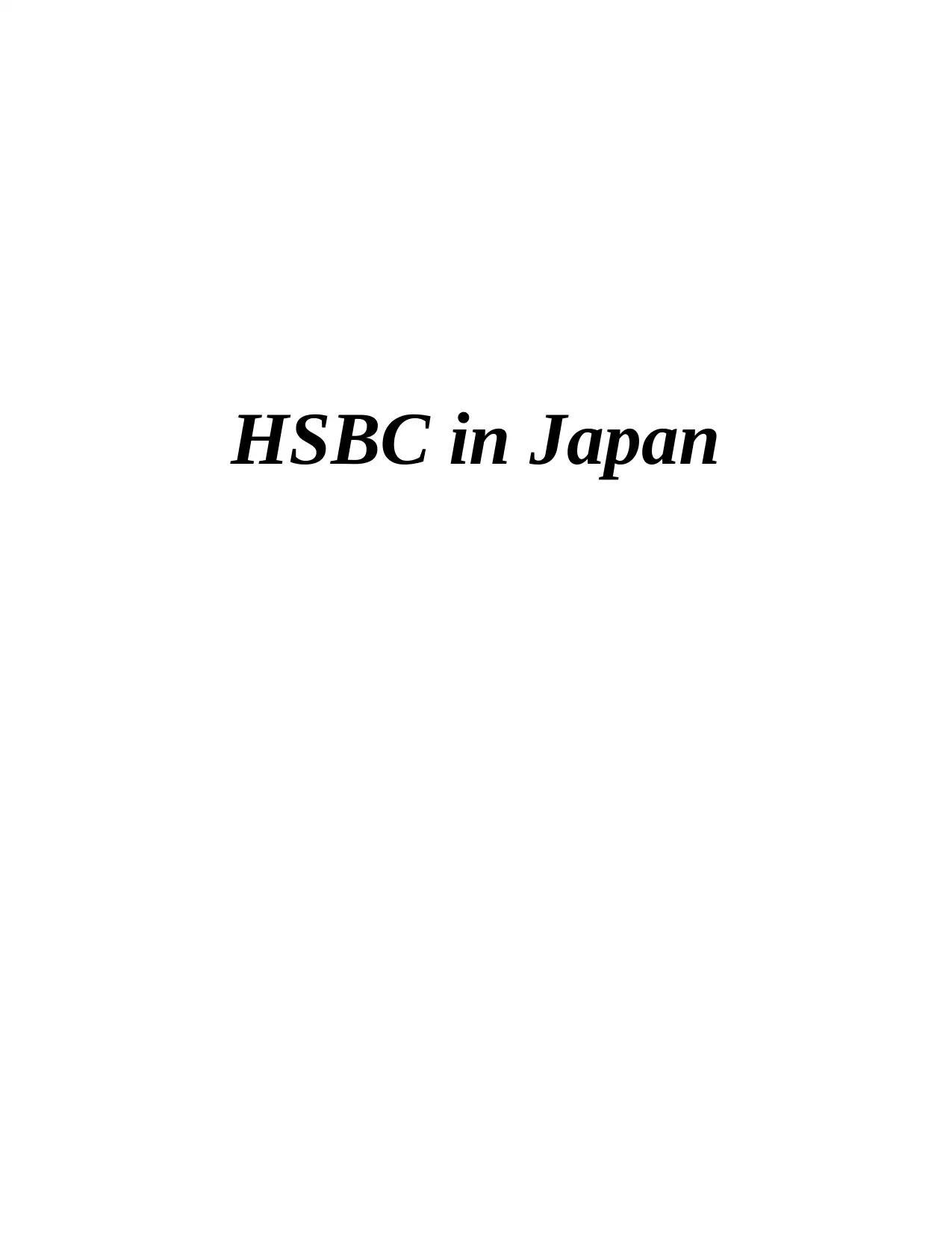
HSBC in Japan
Paraphrase This Document
Need a fresh take? Get an instant paraphrase of this document with our AI Paraphraser
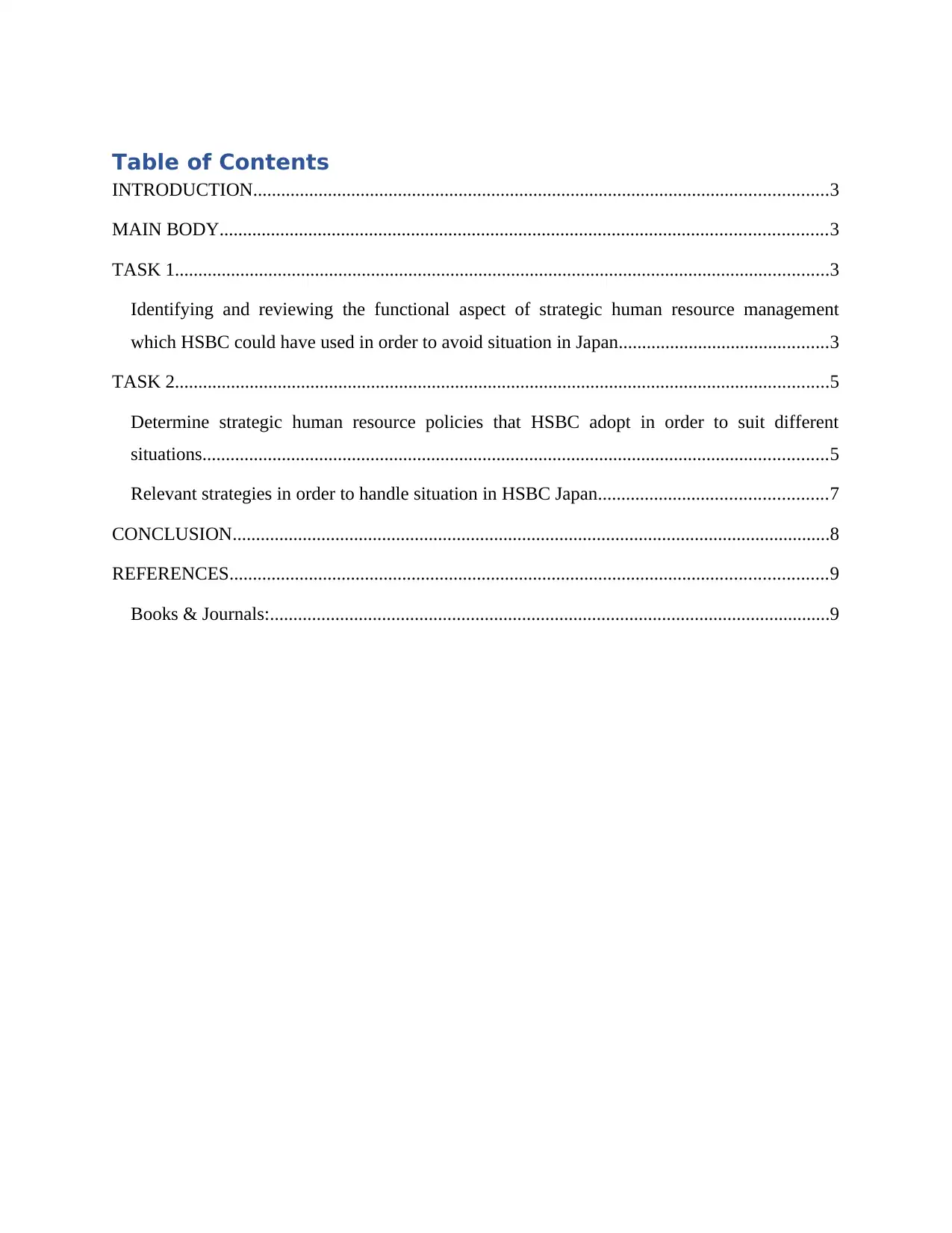
Table of Contents
INTRODUCTION...........................................................................................................................3
MAIN BODY..................................................................................................................................3
TASK 1............................................................................................................................................3
Identifying and reviewing the functional aspect of strategic human resource management
which HSBC could have used in order to avoid situation in Japan.............................................3
TASK 2............................................................................................................................................5
Determine strategic human resource policies that HSBC adopt in order to suit different
situations......................................................................................................................................5
Relevant strategies in order to handle situation in HSBC Japan.................................................7
CONCLUSION................................................................................................................................8
REFERENCES................................................................................................................................9
Books & Journals:........................................................................................................................9
INTRODUCTION...........................................................................................................................3
MAIN BODY..................................................................................................................................3
TASK 1............................................................................................................................................3
Identifying and reviewing the functional aspect of strategic human resource management
which HSBC could have used in order to avoid situation in Japan.............................................3
TASK 2............................................................................................................................................5
Determine strategic human resource policies that HSBC adopt in order to suit different
situations......................................................................................................................................5
Relevant strategies in order to handle situation in HSBC Japan.................................................7
CONCLUSION................................................................................................................................8
REFERENCES................................................................................................................................9
Books & Journals:........................................................................................................................9
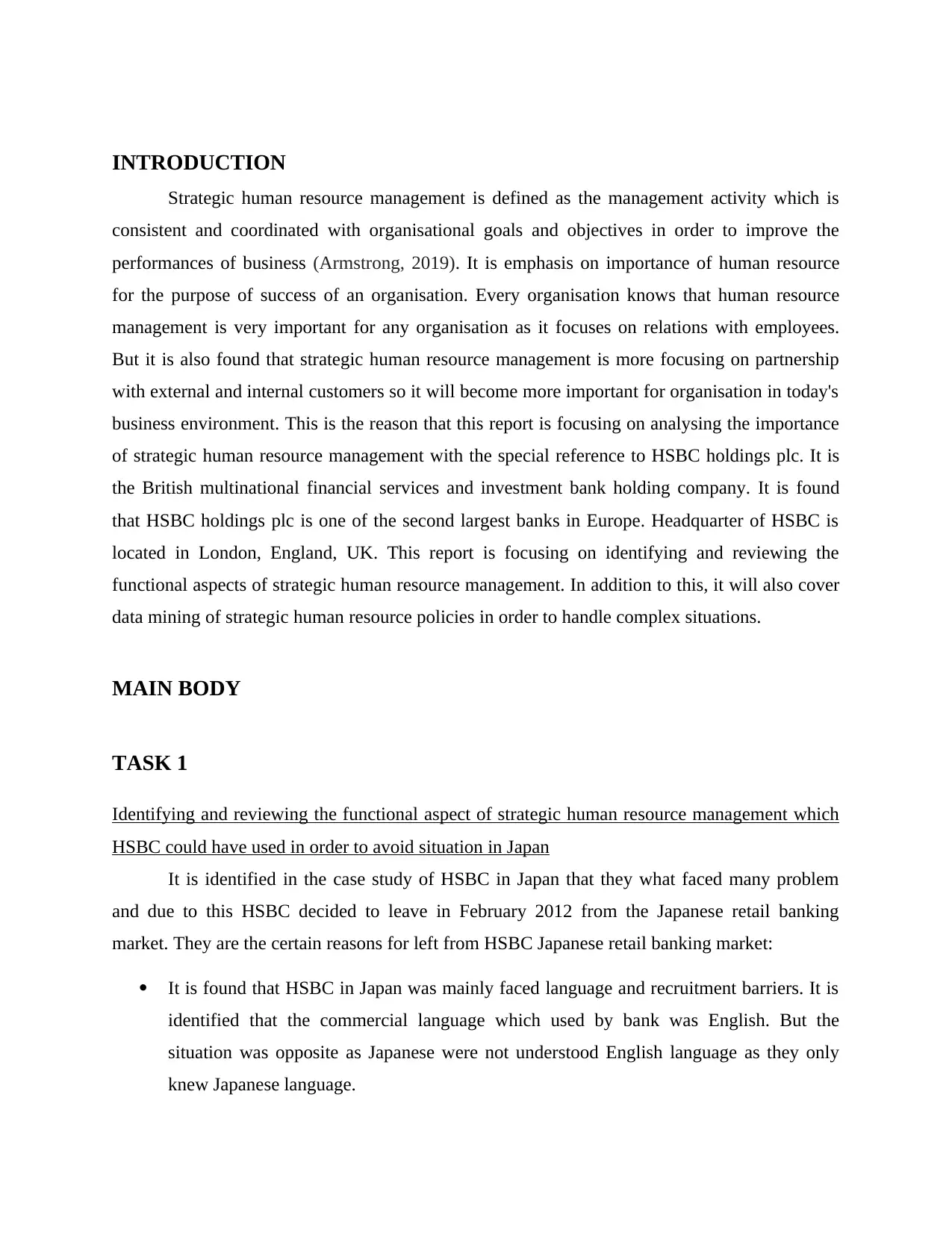
INTRODUCTION
Strategic human resource management is defined as the management activity which is
consistent and coordinated with organisational goals and objectives in order to improve the
performances of business (Armstrong, 2019). It is emphasis on importance of human resource
for the purpose of success of an organisation. Every organisation knows that human resource
management is very important for any organisation as it focuses on relations with employees.
But it is also found that strategic human resource management is more focusing on partnership
with external and internal customers so it will become more important for organisation in today's
business environment. This is the reason that this report is focusing on analysing the importance
of strategic human resource management with the special reference to HSBC holdings plc. It is
the British multinational financial services and investment bank holding company. It is found
that HSBC holdings plc is one of the second largest banks in Europe. Headquarter of HSBC is
located in London, England, UK. This report is focusing on identifying and reviewing the
functional aspects of strategic human resource management. In addition to this, it will also cover
data mining of strategic human resource policies in order to handle complex situations.
MAIN BODY
TASK 1
Identifying and reviewing the functional aspect of strategic human resource management which
HSBC could have used in order to avoid situation in Japan
It is identified in the case study of HSBC in Japan that they what faced many problem
and due to this HSBC decided to leave in February 2012 from the Japanese retail banking
market. They are the certain reasons for left from HSBC Japanese retail banking market:
It is found that HSBC in Japan was mainly faced language and recruitment barriers. It is
identified that the commercial language which used by bank was English. But the
situation was opposite as Japanese were not understood English language as they only
knew Japanese language.
Strategic human resource management is defined as the management activity which is
consistent and coordinated with organisational goals and objectives in order to improve the
performances of business (Armstrong, 2019). It is emphasis on importance of human resource
for the purpose of success of an organisation. Every organisation knows that human resource
management is very important for any organisation as it focuses on relations with employees.
But it is also found that strategic human resource management is more focusing on partnership
with external and internal customers so it will become more important for organisation in today's
business environment. This is the reason that this report is focusing on analysing the importance
of strategic human resource management with the special reference to HSBC holdings plc. It is
the British multinational financial services and investment bank holding company. It is found
that HSBC holdings plc is one of the second largest banks in Europe. Headquarter of HSBC is
located in London, England, UK. This report is focusing on identifying and reviewing the
functional aspects of strategic human resource management. In addition to this, it will also cover
data mining of strategic human resource policies in order to handle complex situations.
MAIN BODY
TASK 1
Identifying and reviewing the functional aspect of strategic human resource management which
HSBC could have used in order to avoid situation in Japan
It is identified in the case study of HSBC in Japan that they what faced many problem
and due to this HSBC decided to leave in February 2012 from the Japanese retail banking
market. They are the certain reasons for left from HSBC Japanese retail banking market:
It is found that HSBC in Japan was mainly faced language and recruitment barriers. It is
identified that the commercial language which used by bank was English. But the
situation was opposite as Japanese were not understood English language as they only
knew Japanese language.
⊘ This is a preview!⊘
Do you want full access?
Subscribe today to unlock all pages.

Trusted by 1+ million students worldwide
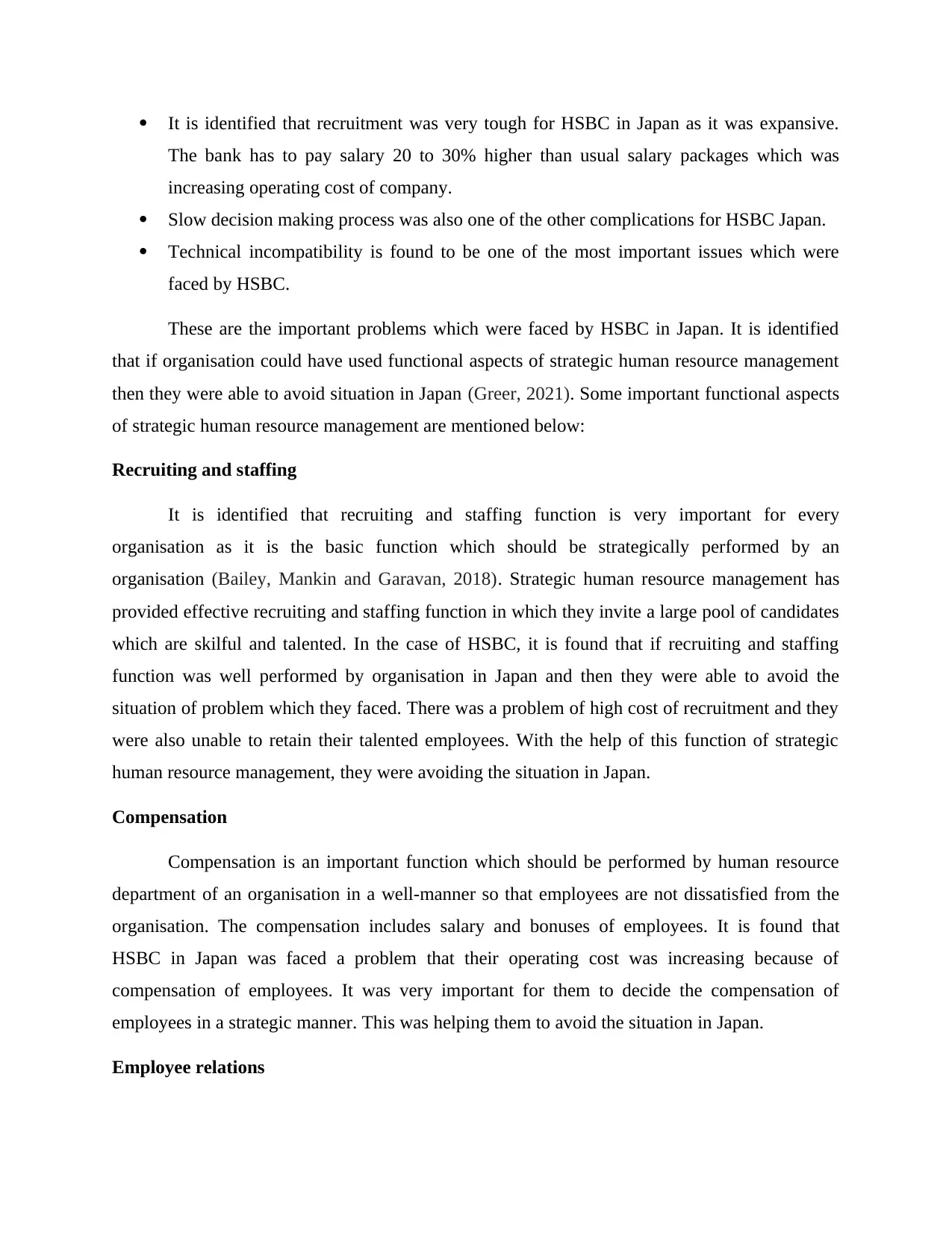
It is identified that recruitment was very tough for HSBC in Japan as it was expansive.
The bank has to pay salary 20 to 30% higher than usual salary packages which was
increasing operating cost of company.
Slow decision making process was also one of the other complications for HSBC Japan.
Technical incompatibility is found to be one of the most important issues which were
faced by HSBC.
These are the important problems which were faced by HSBC in Japan. It is identified
that if organisation could have used functional aspects of strategic human resource management
then they were able to avoid situation in Japan (Greer, 2021). Some important functional aspects
of strategic human resource management are mentioned below:
Recruiting and staffing
It is identified that recruiting and staffing function is very important for every
organisation as it is the basic function which should be strategically performed by an
organisation (Bailey, Mankin and Garavan, 2018). Strategic human resource management has
provided effective recruiting and staffing function in which they invite a large pool of candidates
which are skilful and talented. In the case of HSBC, it is found that if recruiting and staffing
function was well performed by organisation in Japan and then they were able to avoid the
situation of problem which they faced. There was a problem of high cost of recruitment and they
were also unable to retain their talented employees. With the help of this function of strategic
human resource management, they were avoiding the situation in Japan.
Compensation
Compensation is an important function which should be performed by human resource
department of an organisation in a well-manner so that employees are not dissatisfied from the
organisation. The compensation includes salary and bonuses of employees. It is found that
HSBC in Japan was faced a problem that their operating cost was increasing because of
compensation of employees. It was very important for them to decide the compensation of
employees in a strategic manner. This was helping them to avoid the situation in Japan.
Employee relations
The bank has to pay salary 20 to 30% higher than usual salary packages which was
increasing operating cost of company.
Slow decision making process was also one of the other complications for HSBC Japan.
Technical incompatibility is found to be one of the most important issues which were
faced by HSBC.
These are the important problems which were faced by HSBC in Japan. It is identified
that if organisation could have used functional aspects of strategic human resource management
then they were able to avoid situation in Japan (Greer, 2021). Some important functional aspects
of strategic human resource management are mentioned below:
Recruiting and staffing
It is identified that recruiting and staffing function is very important for every
organisation as it is the basic function which should be strategically performed by an
organisation (Bailey, Mankin and Garavan, 2018). Strategic human resource management has
provided effective recruiting and staffing function in which they invite a large pool of candidates
which are skilful and talented. In the case of HSBC, it is found that if recruiting and staffing
function was well performed by organisation in Japan and then they were able to avoid the
situation of problem which they faced. There was a problem of high cost of recruitment and they
were also unable to retain their talented employees. With the help of this function of strategic
human resource management, they were avoiding the situation in Japan.
Compensation
Compensation is an important function which should be performed by human resource
department of an organisation in a well-manner so that employees are not dissatisfied from the
organisation. The compensation includes salary and bonuses of employees. It is found that
HSBC in Japan was faced a problem that their operating cost was increasing because of
compensation of employees. It was very important for them to decide the compensation of
employees in a strategic manner. This was helping them to avoid the situation in Japan.
Employee relations
Paraphrase This Document
Need a fresh take? Get an instant paraphrase of this document with our AI Paraphraser
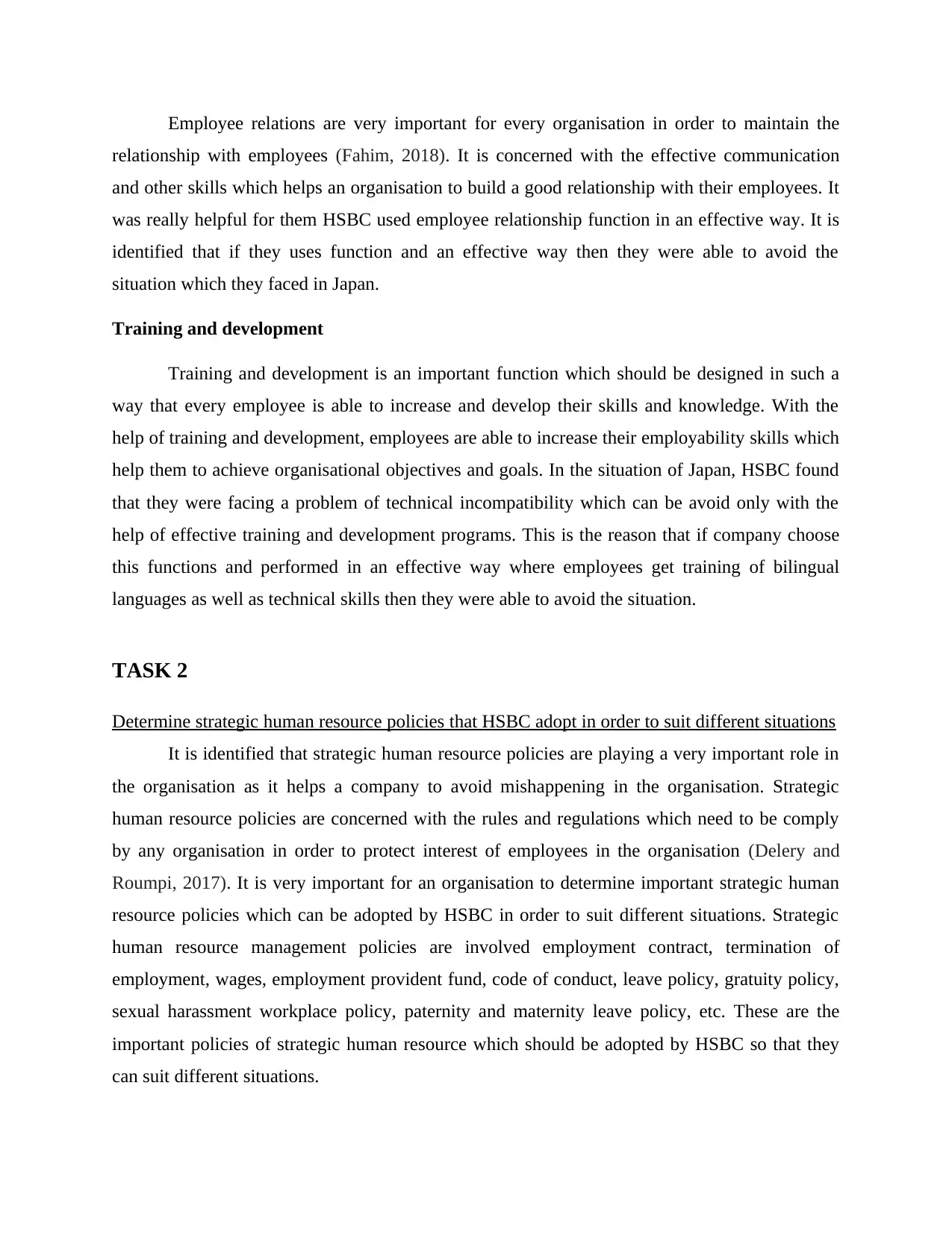
Employee relations are very important for every organisation in order to maintain the
relationship with employees (Fahim, 2018). It is concerned with the effective communication
and other skills which helps an organisation to build a good relationship with their employees. It
was really helpful for them HSBC used employee relationship function in an effective way. It is
identified that if they uses function and an effective way then they were able to avoid the
situation which they faced in Japan.
Training and development
Training and development is an important function which should be designed in such a
way that every employee is able to increase and develop their skills and knowledge. With the
help of training and development, employees are able to increase their employability skills which
help them to achieve organisational objectives and goals. In the situation of Japan, HSBC found
that they were facing a problem of technical incompatibility which can be avoid only with the
help of effective training and development programs. This is the reason that if company choose
this functions and performed in an effective way where employees get training of bilingual
languages as well as technical skills then they were able to avoid the situation.
TASK 2
Determine strategic human resource policies that HSBC adopt in order to suit different situations
It is identified that strategic human resource policies are playing a very important role in
the organisation as it helps a company to avoid mishappening in the organisation. Strategic
human resource policies are concerned with the rules and regulations which need to be comply
by any organisation in order to protect interest of employees in the organisation (Delery and
Roumpi, 2017). It is very important for an organisation to determine important strategic human
resource policies which can be adopted by HSBC in order to suit different situations. Strategic
human resource management policies are involved employment contract, termination of
employment, wages, employment provident fund, code of conduct, leave policy, gratuity policy,
sexual harassment workplace policy, paternity and maternity leave policy, etc. These are the
important policies of strategic human resource which should be adopted by HSBC so that they
can suit different situations.
relationship with employees (Fahim, 2018). It is concerned with the effective communication
and other skills which helps an organisation to build a good relationship with their employees. It
was really helpful for them HSBC used employee relationship function in an effective way. It is
identified that if they uses function and an effective way then they were able to avoid the
situation which they faced in Japan.
Training and development
Training and development is an important function which should be designed in such a
way that every employee is able to increase and develop their skills and knowledge. With the
help of training and development, employees are able to increase their employability skills which
help them to achieve organisational objectives and goals. In the situation of Japan, HSBC found
that they were facing a problem of technical incompatibility which can be avoid only with the
help of effective training and development programs. This is the reason that if company choose
this functions and performed in an effective way where employees get training of bilingual
languages as well as technical skills then they were able to avoid the situation.
TASK 2
Determine strategic human resource policies that HSBC adopt in order to suit different situations
It is identified that strategic human resource policies are playing a very important role in
the organisation as it helps a company to avoid mishappening in the organisation. Strategic
human resource policies are concerned with the rules and regulations which need to be comply
by any organisation in order to protect interest of employees in the organisation (Delery and
Roumpi, 2017). It is very important for an organisation to determine important strategic human
resource policies which can be adopted by HSBC in order to suit different situations. Strategic
human resource management policies are involved employment contract, termination of
employment, wages, employment provident fund, code of conduct, leave policy, gratuity policy,
sexual harassment workplace policy, paternity and maternity leave policy, etc. These are the
important policies of strategic human resource which should be adopted by HSBC so that they
can suit different situations.
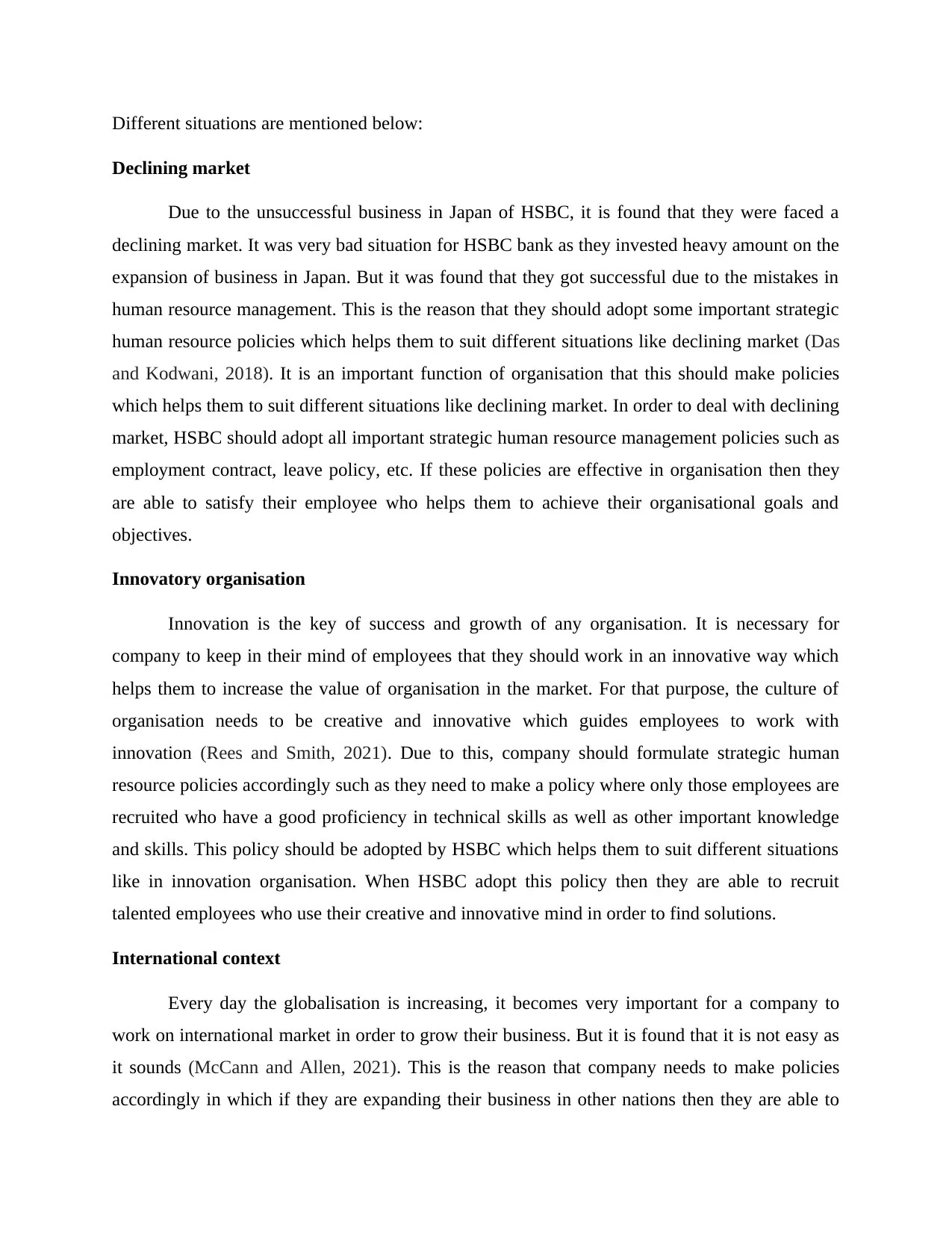
Different situations are mentioned below:
Declining market
Due to the unsuccessful business in Japan of HSBC, it is found that they were faced a
declining market. It was very bad situation for HSBC bank as they invested heavy amount on the
expansion of business in Japan. But it was found that they got successful due to the mistakes in
human resource management. This is the reason that they should adopt some important strategic
human resource policies which helps them to suit different situations like declining market (Das
and Kodwani, 2018). It is an important function of organisation that this should make policies
which helps them to suit different situations like declining market. In order to deal with declining
market, HSBC should adopt all important strategic human resource management policies such as
employment contract, leave policy, etc. If these policies are effective in organisation then they
are able to satisfy their employee who helps them to achieve their organisational goals and
objectives.
Innovatory organisation
Innovation is the key of success and growth of any organisation. It is necessary for
company to keep in their mind of employees that they should work in an innovative way which
helps them to increase the value of organisation in the market. For that purpose, the culture of
organisation needs to be creative and innovative which guides employees to work with
innovation (Rees and Smith, 2021). Due to this, company should formulate strategic human
resource policies accordingly such as they need to make a policy where only those employees are
recruited who have a good proficiency in technical skills as well as other important knowledge
and skills. This policy should be adopted by HSBC which helps them to suit different situations
like in innovation organisation. When HSBC adopt this policy then they are able to recruit
talented employees who use their creative and innovative mind in order to find solutions.
International context
Every day the globalisation is increasing, it becomes very important for a company to
work on international market in order to grow their business. But it is found that it is not easy as
it sounds (McCann and Allen, 2021). This is the reason that company needs to make policies
accordingly in which if they are expanding their business in other nations then they are able to
Declining market
Due to the unsuccessful business in Japan of HSBC, it is found that they were faced a
declining market. It was very bad situation for HSBC bank as they invested heavy amount on the
expansion of business in Japan. But it was found that they got successful due to the mistakes in
human resource management. This is the reason that they should adopt some important strategic
human resource policies which helps them to suit different situations like declining market (Das
and Kodwani, 2018). It is an important function of organisation that this should make policies
which helps them to suit different situations like declining market. In order to deal with declining
market, HSBC should adopt all important strategic human resource management policies such as
employment contract, leave policy, etc. If these policies are effective in organisation then they
are able to satisfy their employee who helps them to achieve their organisational goals and
objectives.
Innovatory organisation
Innovation is the key of success and growth of any organisation. It is necessary for
company to keep in their mind of employees that they should work in an innovative way which
helps them to increase the value of organisation in the market. For that purpose, the culture of
organisation needs to be creative and innovative which guides employees to work with
innovation (Rees and Smith, 2021). Due to this, company should formulate strategic human
resource policies accordingly such as they need to make a policy where only those employees are
recruited who have a good proficiency in technical skills as well as other important knowledge
and skills. This policy should be adopted by HSBC which helps them to suit different situations
like in innovation organisation. When HSBC adopt this policy then they are able to recruit
talented employees who use their creative and innovative mind in order to find solutions.
International context
Every day the globalisation is increasing, it becomes very important for a company to
work on international market in order to grow their business. But it is found that it is not easy as
it sounds (McCann and Allen, 2021). This is the reason that company needs to make policies
accordingly in which if they are expanding their business in other nations then they are able to
⊘ This is a preview!⊘
Do you want full access?
Subscribe today to unlock all pages.

Trusted by 1+ million students worldwide
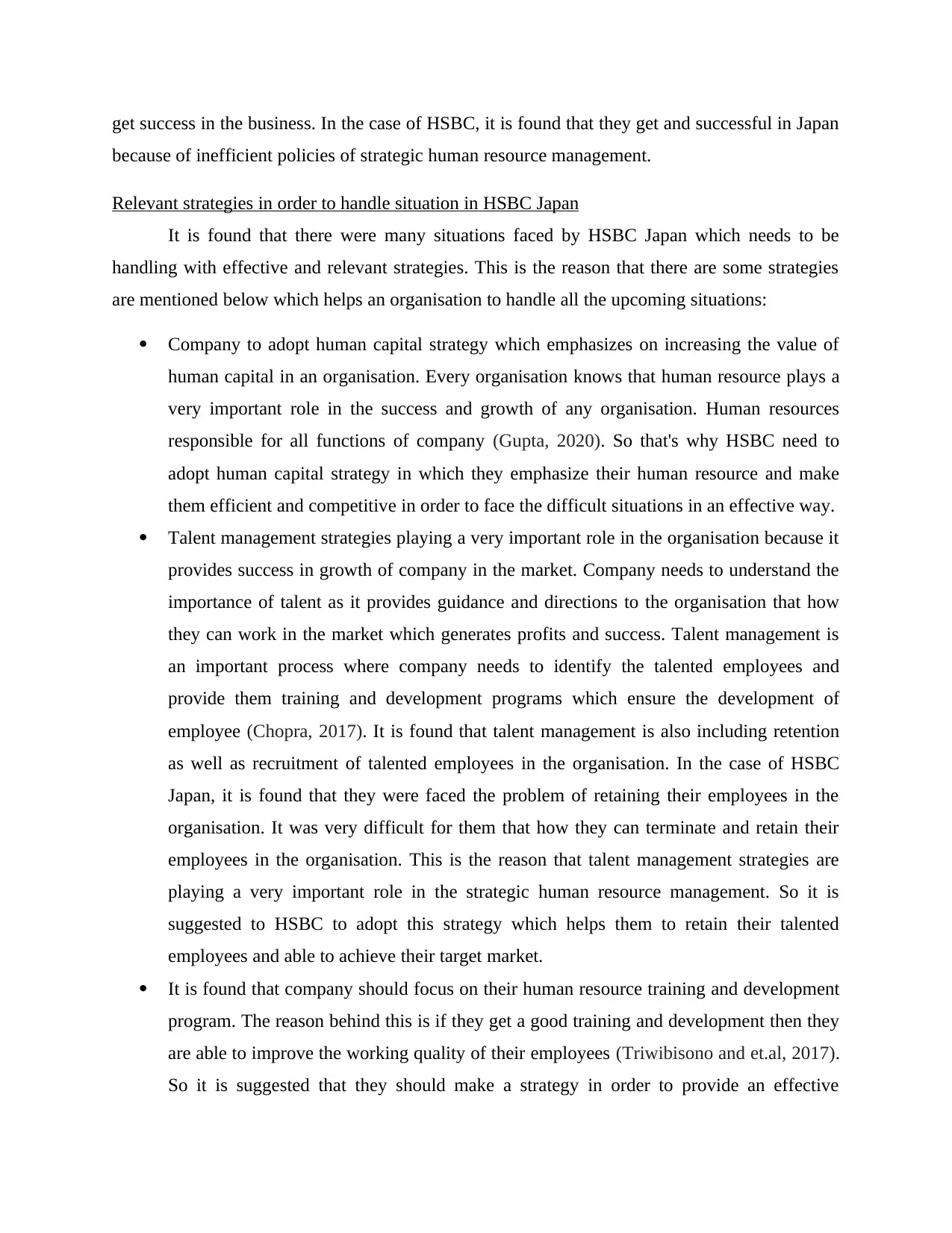
get success in the business. In the case of HSBC, it is found that they get and successful in Japan
because of inefficient policies of strategic human resource management.
Relevant strategies in order to handle situation in HSBC Japan
It is found that there were many situations faced by HSBC Japan which needs to be
handling with effective and relevant strategies. This is the reason that there are some strategies
are mentioned below which helps an organisation to handle all the upcoming situations:
Company to adopt human capital strategy which emphasizes on increasing the value of
human capital in an organisation. Every organisation knows that human resource plays a
very important role in the success and growth of any organisation. Human resources
responsible for all functions of company (Gupta, 2020). So that's why HSBC need to
adopt human capital strategy in which they emphasize their human resource and make
them efficient and competitive in order to face the difficult situations in an effective way.
Talent management strategies playing a very important role in the organisation because it
provides success in growth of company in the market. Company needs to understand the
importance of talent as it provides guidance and directions to the organisation that how
they can work in the market which generates profits and success. Talent management is
an important process where company needs to identify the talented employees and
provide them training and development programs which ensure the development of
employee (Chopra, 2017). It is found that talent management is also including retention
as well as recruitment of talented employees in the organisation. In the case of HSBC
Japan, it is found that they were faced the problem of retaining their employees in the
organisation. It was very difficult for them that how they can terminate and retain their
employees in the organisation. This is the reason that talent management strategies are
playing a very important role in the strategic human resource management. So it is
suggested to HSBC to adopt this strategy which helps them to retain their talented
employees and able to achieve their target market.
It is found that company should focus on their human resource training and development
program. The reason behind this is if they get a good training and development then they
are able to improve the working quality of their employees (Triwibisono and et.al, 2017).
So it is suggested that they should make a strategy in order to provide an effective
because of inefficient policies of strategic human resource management.
Relevant strategies in order to handle situation in HSBC Japan
It is found that there were many situations faced by HSBC Japan which needs to be
handling with effective and relevant strategies. This is the reason that there are some strategies
are mentioned below which helps an organisation to handle all the upcoming situations:
Company to adopt human capital strategy which emphasizes on increasing the value of
human capital in an organisation. Every organisation knows that human resource plays a
very important role in the success and growth of any organisation. Human resources
responsible for all functions of company (Gupta, 2020). So that's why HSBC need to
adopt human capital strategy in which they emphasize their human resource and make
them efficient and competitive in order to face the difficult situations in an effective way.
Talent management strategies playing a very important role in the organisation because it
provides success in growth of company in the market. Company needs to understand the
importance of talent as it provides guidance and directions to the organisation that how
they can work in the market which generates profits and success. Talent management is
an important process where company needs to identify the talented employees and
provide them training and development programs which ensure the development of
employee (Chopra, 2017). It is found that talent management is also including retention
as well as recruitment of talented employees in the organisation. In the case of HSBC
Japan, it is found that they were faced the problem of retaining their employees in the
organisation. It was very difficult for them that how they can terminate and retain their
employees in the organisation. This is the reason that talent management strategies are
playing a very important role in the strategic human resource management. So it is
suggested to HSBC to adopt this strategy which helps them to retain their talented
employees and able to achieve their target market.
It is found that company should focus on their human resource training and development
program. The reason behind this is if they get a good training and development then they
are able to improve the working quality of their employees (Triwibisono and et.al, 2017).
So it is suggested that they should make a strategy in order to provide an effective
Paraphrase This Document
Need a fresh take? Get an instant paraphrase of this document with our AI Paraphraser
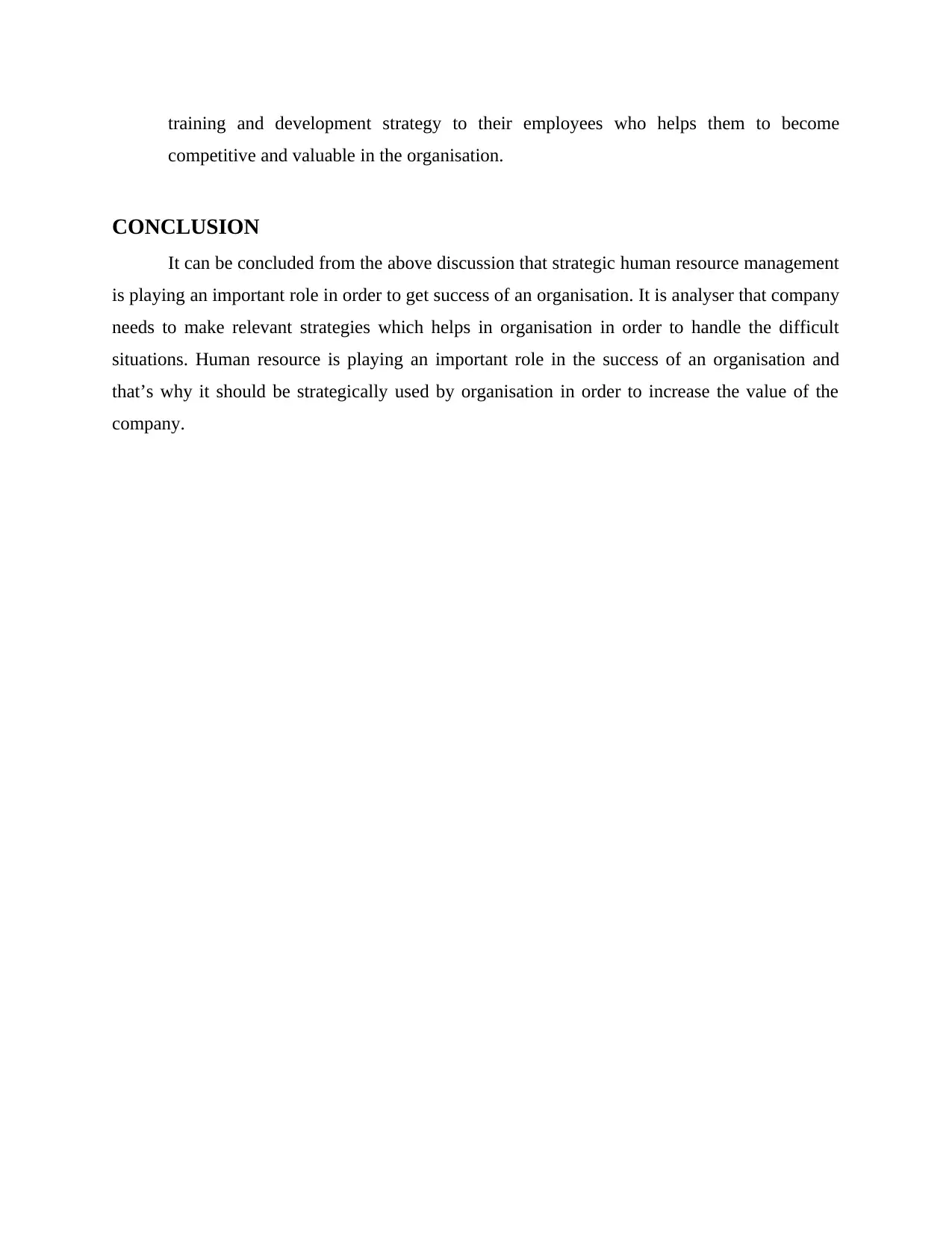
training and development strategy to their employees who helps them to become
competitive and valuable in the organisation.
CONCLUSION
It can be concluded from the above discussion that strategic human resource management
is playing an important role in order to get success of an organisation. It is analyser that company
needs to make relevant strategies which helps in organisation in order to handle the difficult
situations. Human resource is playing an important role in the success of an organisation and
that’s why it should be strategically used by organisation in order to increase the value of the
company.
competitive and valuable in the organisation.
CONCLUSION
It can be concluded from the above discussion that strategic human resource management
is playing an important role in order to get success of an organisation. It is analyser that company
needs to make relevant strategies which helps in organisation in order to handle the difficult
situations. Human resource is playing an important role in the success of an organisation and
that’s why it should be strategically used by organisation in order to increase the value of the
company.
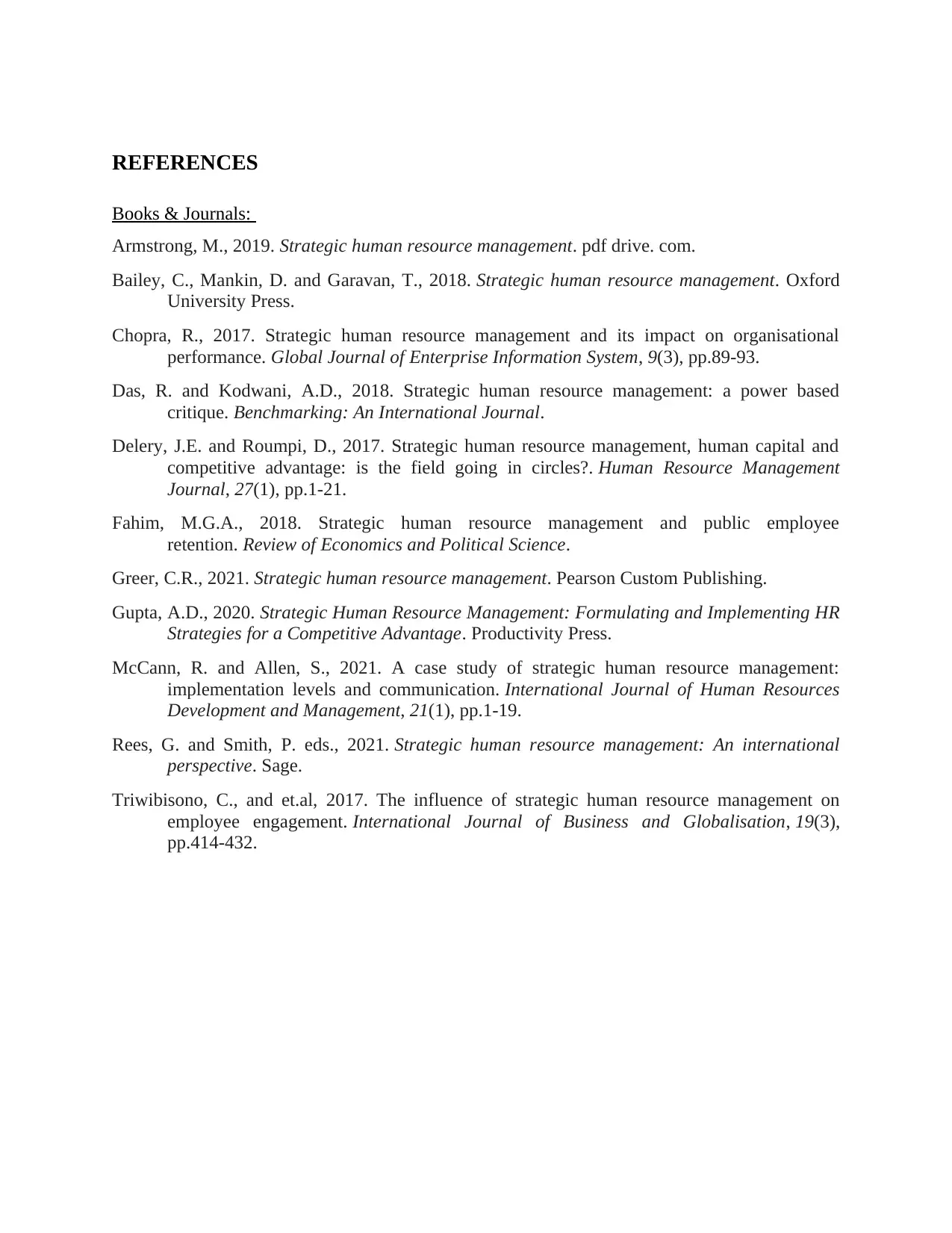
REFERENCES
Books & Journals:
Armstrong, M., 2019. Strategic human resource management. pdf drive. com.
Bailey, C., Mankin, D. and Garavan, T., 2018. Strategic human resource management. Oxford
University Press.
Chopra, R., 2017. Strategic human resource management and its impact on organisational
performance. Global Journal of Enterprise Information System, 9(3), pp.89-93.
Das, R. and Kodwani, A.D., 2018. Strategic human resource management: a power based
critique. Benchmarking: An International Journal.
Delery, J.E. and Roumpi, D., 2017. Strategic human resource management, human capital and
competitive advantage: is the field going in circles?. Human Resource Management
Journal, 27(1), pp.1-21.
Fahim, M.G.A., 2018. Strategic human resource management and public employee
retention. Review of Economics and Political Science.
Greer, C.R., 2021. Strategic human resource management. Pearson Custom Publishing.
Gupta, A.D., 2020. Strategic Human Resource Management: Formulating and Implementing HR
Strategies for a Competitive Advantage. Productivity Press.
McCann, R. and Allen, S., 2021. A case study of strategic human resource management:
implementation levels and communication. International Journal of Human Resources
Development and Management, 21(1), pp.1-19.
Rees, G. and Smith, P. eds., 2021. Strategic human resource management: An international
perspective. Sage.
Triwibisono, C., and et.al, 2017. The influence of strategic human resource management on
employee engagement. International Journal of Business and Globalisation, 19(3),
pp.414-432.
Books & Journals:
Armstrong, M., 2019. Strategic human resource management. pdf drive. com.
Bailey, C., Mankin, D. and Garavan, T., 2018. Strategic human resource management. Oxford
University Press.
Chopra, R., 2017. Strategic human resource management and its impact on organisational
performance. Global Journal of Enterprise Information System, 9(3), pp.89-93.
Das, R. and Kodwani, A.D., 2018. Strategic human resource management: a power based
critique. Benchmarking: An International Journal.
Delery, J.E. and Roumpi, D., 2017. Strategic human resource management, human capital and
competitive advantage: is the field going in circles?. Human Resource Management
Journal, 27(1), pp.1-21.
Fahim, M.G.A., 2018. Strategic human resource management and public employee
retention. Review of Economics and Political Science.
Greer, C.R., 2021. Strategic human resource management. Pearson Custom Publishing.
Gupta, A.D., 2020. Strategic Human Resource Management: Formulating and Implementing HR
Strategies for a Competitive Advantage. Productivity Press.
McCann, R. and Allen, S., 2021. A case study of strategic human resource management:
implementation levels and communication. International Journal of Human Resources
Development and Management, 21(1), pp.1-19.
Rees, G. and Smith, P. eds., 2021. Strategic human resource management: An international
perspective. Sage.
Triwibisono, C., and et.al, 2017. The influence of strategic human resource management on
employee engagement. International Journal of Business and Globalisation, 19(3),
pp.414-432.
⊘ This is a preview!⊘
Do you want full access?
Subscribe today to unlock all pages.

Trusted by 1+ million students worldwide
1 out of 9
Related Documents
Your All-in-One AI-Powered Toolkit for Academic Success.
+13062052269
info@desklib.com
Available 24*7 on WhatsApp / Email
![[object Object]](/_next/static/media/star-bottom.7253800d.svg)
Unlock your academic potential
Copyright © 2020–2026 A2Z Services. All Rights Reserved. Developed and managed by ZUCOL.


